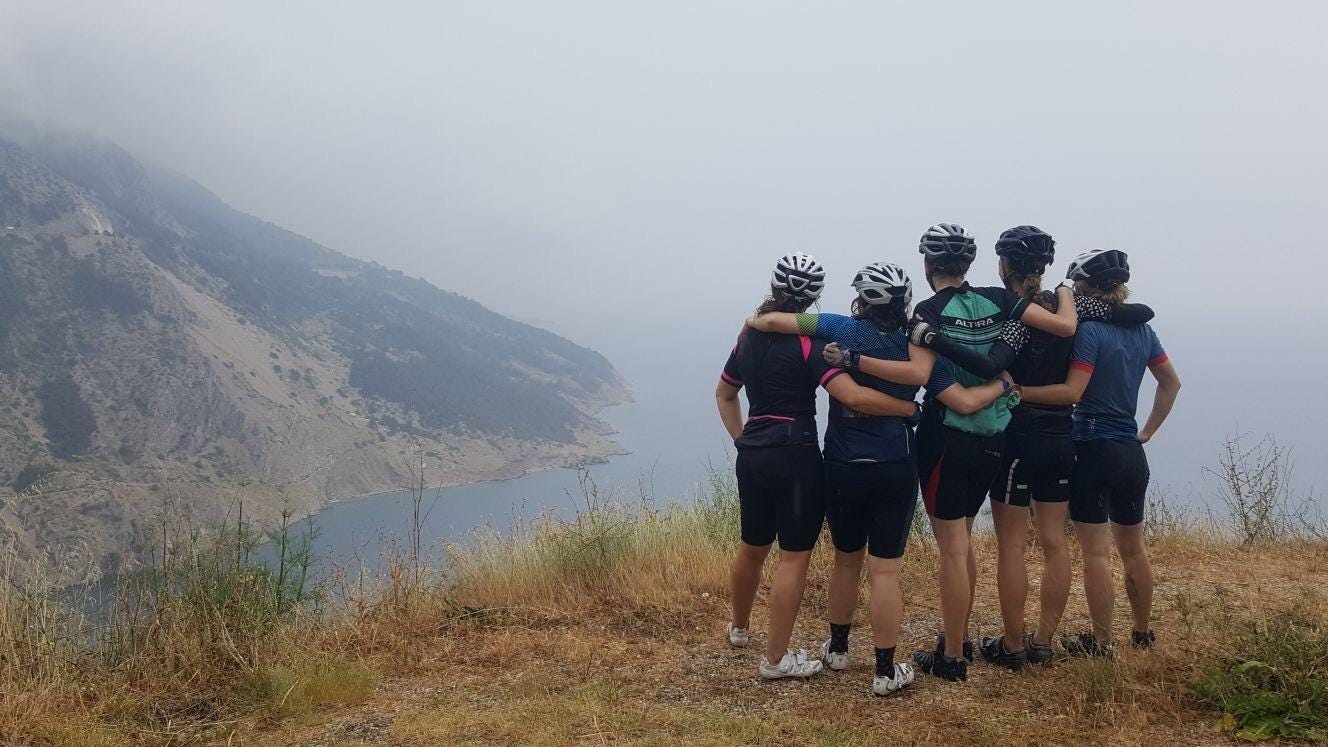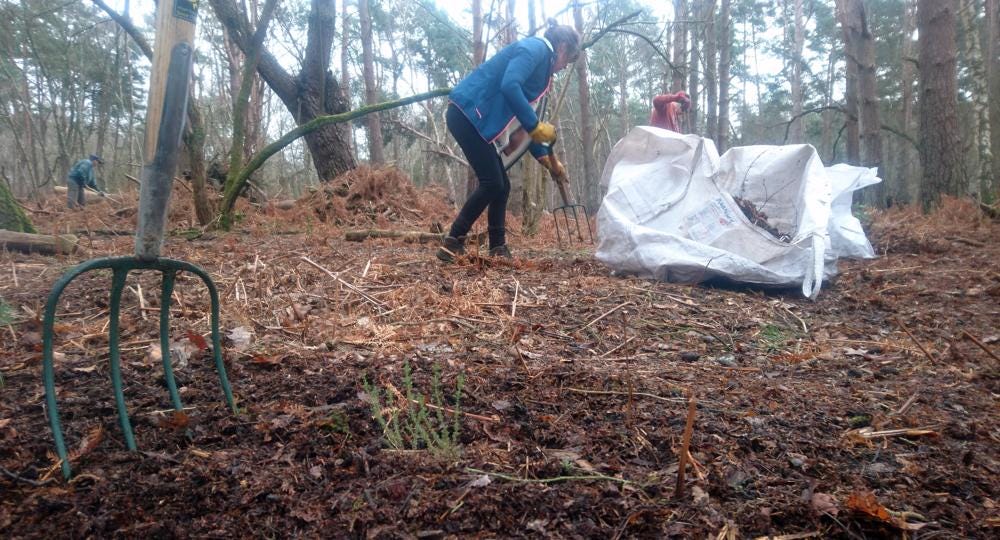Pitchfork attack! on Brownsea Island
Yes, that is a consciously blood-curdling headline for what is, ultimately, a little story about biodiversity and conservation. Apologies in advance if you were hoping for Medieval true crime.

Before anything: the early bird list to join Thighs of Steel this summer closes in a few hours!
If you know anyone who would love a week of adventure cycling through Europe and helping to fundraise for refugees, please please please send them the link, post haste: bit.ly/semisecret :)
Thighs of Steel is a relay-style cycle challenge to Athens. Each participant fundraises a minimum of £500 and takes on one or two weeks of the overall trip. Each leg is completed in small, tight-knit groups. Don’t expect hotels or showers, just adventure — when you don’t know where you’ll sleep that night, the mountain never ends and you embrace the unknown.
Now back to normal programming…
Mulching around on Brownsea Island

As trailed last week, I spent Valentine’s Day on Brownsea Island with a pitchfork. No, sadly not at the head of a Medieval peasant lynch mob; instead I was part of a volunteer conservation team that spent three hours sort of ‘tidying up’ a pine forest.
To the outside observer, we must have looked very Sisyphean: raking up tonnes and tonnes of pine needles and dead bracken only weeks before the spring growth and in the spitting teeth of the inevitable autumnal drop.
So why, why, oh why — tea and biscuits aside — were we there?
There are a lot of Scots, Monterey and Maritime Pines on Brownsea Island, a small island in Poole Harbour, Dorset. Pines grow quickly and tend to dominate. Very little flourishes in their shade, not least due to their poisonous habit of needle dropping.
Beautiful as they are, pine forests aren’t known for their biodiversity.
Two plants do thrive beneath the needles of Brownsea: bracken and rhododendron. Both of which are arguably even more antisocial than the pines who shade them.
There is, however, one unsung habitat on the island that is both a nourishing hotbed of biodiversity and, coincidentally, vanishing under the cities, forests and motorways of the mainland: heath.
Heath, as a landscape, is kind of meh. Underwhelming at best, if you’re not an ecologist. You can sort of see why it gets ripped up and paved over. Sorry.
We all love walking barefoot on the tickly needles of a pine forest, gazing up in awe at the shelfing branches, watching red squirrels scamper up and down the ruddy trunks.
But heathland is all scrubby with plants that are either prickly like gorse, knobbly like ling and bell heather, or slippery like moss. Basically: heath is a bit annoying to wander through if you’re not wearing full body armour.
I’m told, however, that the heath is positively teeming with life: butterflies, bees, spiders, lizards and invertebrates of all flavours. It is the amenable counterpoint to the inhospitable pine forest.
You can see where we’re going with this one, can’t you?
On Brownsea, Dorset Wildlife Trust and the National Trust are working (with the help of brute unpaid labour like me) to extend and connect the pockets of heath on the island, creating corridors down which the wildlife can mooch.
That’s why we spent three hours today raking and pitchforking bales and bales of dead bracken and rhododendron from the forest floor.
This work is a precursor to a ‘thinning out’ of the pines (the winter storms have made a start — I counted six felled trees in our little working acre alone) and a human-assisted return to open heathland.
Heather seed is everywhere on Brownsea, but in the forest it’s buried under a foot of mulch and will never taste the sunshine it needs to pop out and start singing.
I did find one tiny sprig of heather as I raked over the forest. The green filagree shoots were roundly cheered and the pathetic, heroic stem became a sort of totem for the work we were doing. You can spot her in the proud parental photo above.
But, hang on — knee-deep in a climate emergency, doesn’t it feel a bit wrong to be putting so much energy into felling trees? Shouldn’t we be planting them?
In general: yes.
However, also: no. At least, not here.
As one Brownsea conservationist explained to us, heathland is arguably more important to the health of the planet than the dominant, almost monoculture of the pines — and not only because heathland is a vanishing habitat, rich with life.
We all know that the headline climate crisis is too much carbon getting released into the atmosphere. Trees are good because they ‘capture’ (‘sequester’ if you want to get fancy) carbon. Ergo: plant more trees.
But did you know that most of the carbon captured by trees is stored in the soil and litter on the forest floor, not in the trees themselves? (I didn’t until today, to be fair.)
And — here’s the topper — the soil under heathland captures more carbon per hectare than the soil under forests does.
You could argue that, rather than interfering with conservationist projects like the heathland conversion on Brownsea, we should ‘let nature do its work’: let the pines march triumphant across the land, let the rhododendron and bracken crowd out every other species.
But for me this smacks of the similarly bogus ‘let the markets decide’ logic that some conservative economists are fond of trotting out.
No. We’re already interfering in nature for we are nature. The rhododendrons were brought here from Nepal, for goodness sake. Some of the pines were planted as a fuelwood crop. The cattle, pigs and ponies that once kept the Brownsea forests at bay were kept animals, not nature’s own convenient gardeners.
If we want to promote biodiversity (and bloody hell we really do), then we need more interfering.
~
Dorset Wildlife Trust run volunteer conservation days on Brownsea Island every Friday. They’re very welcoming to idiot newbies like me. Peruse their events page for these and other opportunities across the county.
If you don’t live in Dorset (who does?), then seek out your local wildlife trust and volunteer. You won’t regret it. Unless you take a wrong turn with the pitchfork and get burned alive as a witch.
The Rule of Three: Sitcom Families
I’ve been listening to an excess of the Rule of Three podcast recently. As a podcast about comedy writing, it’s pretty much perfect audio for a comedy writer. I make a lot of notes.
(For those of you who are new here, I am one half of the comedy writing duo behind BBC Radio sitcom Foiled - permanently unavailable on BBC Sounds. Series 4 will be out in September — assuming I stop listening to podcasts and actually start writing…)
In an excellent episode with Katy Brand, Rule of Three hosts Joel Morris and Jason Hazeley discuss the concept of the ‘sitcom family’. The characters don’t have to be literal family — although in a lot of cases they are — but sitcoms are often built around family-type dynamics.
For those of you familiar with Foiled, you’ll recognise that the characters are, at heart, a classic Sitcom Family.
Tariq (played by Garnon Davies) is the ‘dad’
Roger (Miles Jupp) is the ‘loose-cannon stepfather’
Tanisha (Stephanie Siadatan) is the ‘mum’
Richie (David Oakes) is the ‘older child’
Sabrina (Beth Granville) is the ‘younger child’
Frankie (Garnon Davies again) is the ‘youngest child’
These roles weren’t always in the writing. We didn’t go into the process thinking, ‘We need an older child, who can that be?’
In the first scripts, on the page, there wasn’t an awful lot to Tariq’s character. It was only at the read-through, when Garnon played Tariq as a world-weary, dead-pan ‘dad’, that the character and, more importantly, the ‘sitcom family’ dynamics clicked into place.
Garnon gave us a ‘dad’ that we hadn't even realised we needed. Genius.
Your neck of the woods?
The next week is something of a mystery. It might involve a last minute leap onto a ferry to meet The Tim Traveller in Paris for miscellaneous Youtube adventures.
Wherever I end up, the coming week will definitely involve a lot more writing time on mine and Beth’s new comedy project.
Happy Palentine’s Day,
dc:
CREDITS
David Charles wrote this newsletter. He publishes another newsletter about reading called Books Make Books. David is co-writer of BBC Radio Wales sitcom Foiled, and writes for The Bike Project, Forests News, Global Landscape Forum, Elevate and Thighs of Steel. He also edits books about adventure, activism and more. Reply to this email, or delve into the archive on davidcharles.info. Thank you for reading!
These weekly newsletters are currently 0.8 percent funded. Wahoo! I hope to always be able to give away all my writing for free. You can help support by becoming a paying subscriber for £30/year. Needless to say: thank you!

